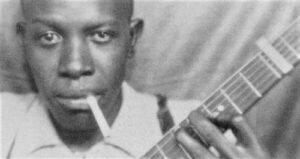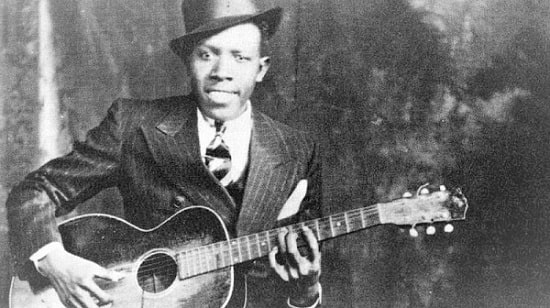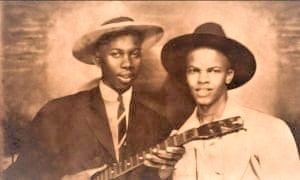Robert Johnson (born on May 8, 1911, as Robert Leroy Dodds in Hazlehurst, Mississippi; Died on August 16, 1938, in Greenwood, Mississippi) was an American blues musician, singer, and songwriter. He is considered one of the most famous guitarists, singers, and songwriters in the history of blues. Robert Johnson was also known as the King of the Delta Blues.
There are many tales of people achieving all sorts of fortune and fame by selling their souls to the devil. Blues guitarist Robert Johnson is probably the most famous subject of that tall tale. The legend goes that he offered his soul at a Mississippi crossroads in 1986, and in return, he would receive musical success and talents beyond his wildest dreams.
This day he is considered a pioneer of American blues guitar and songwriting. His influence on other guitarists began during his lifetime. After his early death and a lively formation of legends about his talent as a guitarist, he remained known only to blues collectors and musicians.
Even then other blues musicians recorded pieces by Robert Johnson but did not always name Johnson as the author. Sometimes Johnson’s pieces were simply called traditional. A wide white audience Johnson was founded in 1961 by the release of the album King of the Delta Blues Singers famous overnight.
From then on, many blues and rock-oriented bands such as Cream or The Rolling Stones played pieces by Johnson at concerts and in the studio. Guitarists likeEric Clapton or Keith Richards called his style an essential inspiration for their music career. Today, Johnson is regarded as the most influential guitarist and songwriter of the Delta blues.
In 1980 he was inducted into the Blues Hall of Fame. Rolling Stone’s David Fricke placed Johnson at number 5 on his list of the 100 Greatest Guitarists of All Time in 2004. In the regular list, it ranks 71.

Quick Facts: Robert Johnson
- Born: 8 May 1911, Hazlehurst, Mississippi, United States
- Also known As: Robert Leroy Johnson and The King of the Delta Blues
- Known For: An American blues musician, singer, and songwriter
- Instruments: Guitar, vocals, harmonica
- Nationality: United States
- Parents: Father – Noah Johnson, Mother – Julia Major Dodds
- Spouse: Virginia Travis (m. 1929–1930), Caletta Craft (m. 1931–1938)
- Died: 16 August 1938, Greenwood, Mississippi, United States
- Quotes: “Believe in yourself and have confidence that you can compete against all odds. Have a vision of what you’d like to accomplish and be able to articulate that vision.” – Robert Johnson
The Early Life of Robert Johnson
Robert Johnson was born in Hazlehurst, Mississippi on May 8, 1911, spending much of his beginnings on a plantation in the Delta. His mother, Julia Major Dodds, was a daughter of slaves. Dodds had ten children with her husband, but Robert was born out of an affair with a field hand named Noah Johnson.
Later in Robert’s childhood, Julia remarried and moved the family to Robinsonville, Mississippi. Robert seemed to take to music quickly as a child, demonstrating keen musical ability both on the jaw harp and harmonica. That interest didn’t fade as he grew into his teens, as he was absent from school more and more, which his friends attributed to him studying music in Memphis.
He would also play around with a makeshift instrument called a diddley bow, which was a wire attached to a house that a person could pull taut and hit with a stick, altering the pitch with a bottle that slides along the wire. The early and teenage years of Robert Johnson are very much shrouded in mystery.
Historians have had to lean on unreliable tales from other musicians and friends of his from those days, which is a lot like playing a game of telephone. There just isn’t much to go on, and his Johnson’s nomadic nature made it even harder to get a sense of his beginnings.
He’d pester every local musician he could for a chance to share a stage of a jam session with them. Many times, between other musicians’ sets, Robert would take over the stage and play some songs of his own. A bold move for sure.
Legendary bluesman Son House knew Robert Johnson during these years, and wasn’t exactly blown away by the young man’s ability at the time: “Folks they come and say, ‘Why don’t you go out and make that boy put that thing down?
He running us crazy,’ ” House said. “Finally he left. He runs off from his mother and father, and went over in Arkansas some place or other.”
Marriage
When he was 18, Robert married 16-year-old Virginia Travis, but tragedy struck soon after, as she died during childbirth. Rumors abounded that it was punishment for his burgeoning musician lifestyle, but he forged ahead, deciding to dedicate his life to becoming a bluesman.
He did manage to marry again in 1931, at the age of 20, though she too died while giving birth. This set him on an even more solitary path. Johnson would stay with numerous women, whom he would return to from time to time, but he remained single, adopting different aliases.
The women he frequented mostly didn’t know about each other, and he preferred it that way. He was a loner, committed to playing music and traveling the road, playing music at his frequent stops. At his shows, he would play mostly crowd-pleasing songs of the time, including jazz and country standards.
And even though he would form strong temporary relationships with the townsfolk and local musicians, his stays would be brief, and then he would move on as easily as the breeze.


